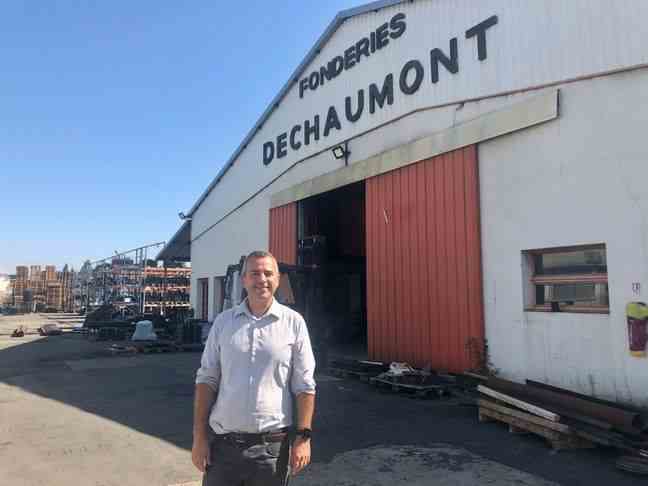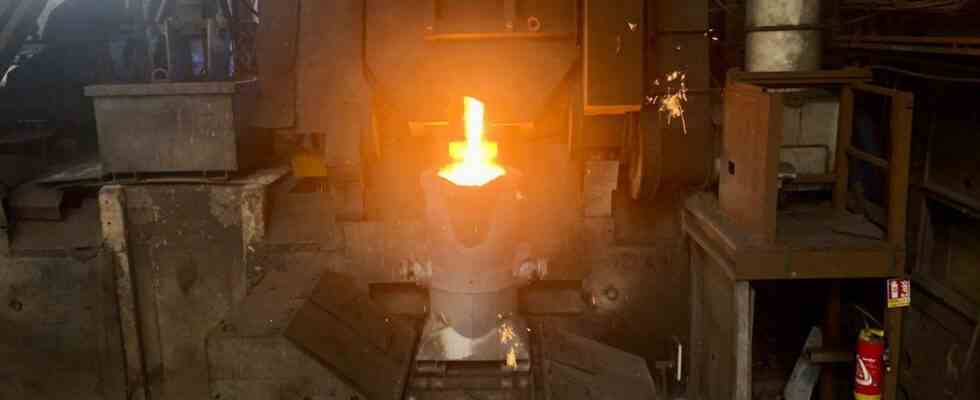“Usually, we are rather” let’s live well, live discreetly “, but there, the situation is serious”, loose Jean-Baptiste Dechaumont, boss of the foundries of the same name, created in 1860 in Muret, south of Toulouse. For this small company of 150 employees which produces cast iron parts for roads or street furniture, the energy crisis is not limited to a simple title in the news feed. She hits him hard.
This is what decided him to appeal last week to Christophe Bex (Nupes), the new deputy for his constituency. In a video with the parliamentarian, he highlighted the risks for smelters if electricity continues to be traded at such a high price. And the elected official recalled that if jobs were to be destroyed, it would be difficult to recreate them afterwards.
Because to run its machines and ovens, it consumes 11 gigabytes of electricity each year, 70% of which is to power the fusion process. This is the equivalent of the consumption of a village of 5,000 inhabitants. Which earned him an electricity bill of 1.5 million euros this year.
Increase from 70 to 600 euros per MWh
On an annual turnover of 20 million euros, it is far from being a straw. So, as much to say that in recent weeks, he has his eyes riveted on the price of the kilowatt hour and the energy crisis which has shaken European countries since the start of the conflict in Ukraine. “Three years ago, this budget was halved, to 750,000 euros, with a well-negotiated contract in 2016 at 37 euros per MWh. Last year we negotiated it at 70 euros per MWh. This morning, the price per MWh still exceeds 600 euros, completely decorrelated from production prices which are 80 to 100 per MWh. This would lead us to energy budgets of 6 to 8 million euros for 2023. We cannot accept such a significant increase, it would be harmful for the foundries”, explains to 20 minutes the entrepreneur who must sign his new contract with EDF by October 31. Contracts he signed for one, two or three years depending on the price he had managed to negotiate.

He tells himself that he should have signed last year for two years. But, “without a crystal ball” on Russia’s intentions to invade Ukraine, he did not commit. With a hint of regret. Even if he hesitates to imagine himself on very long contracts, because given the place of energy consumption in his expenses, 8% of his expenses, he wants to allow himself the possibility of buying electricity at a better price if ever its price found a more reasonable rate.
There, if he were obliged to pass on the current increase to the prices of his manufactured products, the increases would approach 30 to 40%. It could then no longer be competitive vis-à-vis other French and foreign companies, which often continue to use foundry coke, made from coal that is much cheaper but clearly more polluting than electricity. “Today, we find ourselves with an electricity price which is multiplied by ten and a coke which is multiplied by two”, deplores Jean-Baptiste Dechaumont, who has already had to manage the Covid-19 and the increase in materials. premieres in the past two years.
Received at Bercy next week
For him, there is a real lack of anticipation. The alarm bell had already been sounded a year ago with the bankruptcy of the alternative supplier Hydroption. Since then, many have mobilized to demand the revision of the rules for calculating market prices. Aid was put in place in July for companies whose energy represents more than 3% of turnover. But Fonderies Dechaumont was not entitled to it. “Because we earn money, little, but we earn,” says the boss.
He asked EDF if he could have a price offer, with a part at the regulated tariff and another subject to market fluctuations. He was told that it was not possible for companies of his size, too small this time. Among the 25 alternative electricity suppliers, none made him price offers either. However, it is ready to stop production on days of high consumption, as has already been the case during harsh winters.
Today, he is waiting, a little reassured to see that this subject is now at the top of the pile of files to be dealt with within the government, but also within the European Union. And his cry of alarm seems to have been heard. Next week he will be part of the companies of the Russian forge foundry received at Bercy to discuss these issues. He will go with a leitmotif: “he has to cap and regulate”.

